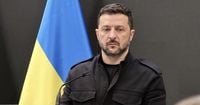Ukrainian President Volodymyr Zelensky has announced that Kyiv is prepared to implement a "complete ceasefire" immediately, following a significant phone call with U.S. President Donald Trump on May 8, 2025. In a message posted on his official Telegram channel, Zelensky emphasized that discussions during the call focused on measures to establish a real and lasting ceasefire, the current situation at the front lines, and ongoing diplomatic efforts.
Zelensky stated that the ceasefire should last at least 30 days, arguing that such a duration would create numerous opportunities for diplomacy. He called on Russia to respond appropriately to this proposal and to demonstrate goodwill in ending the conflict, while also urging Washington to support this initiative.
This announcement comes in the context of Russia's unilateral declaration of a 72-hour ceasefire to commemorate Victory Day, which honors the Soviet Union's victory over Nazi Germany. From midnight on May 8 until midnight on May 11, Russian forces have ceased combat operations, maintaining their positions and only responding if attacked by Ukraine, according to the Russian Ministry of Defense.
However, despite the ceasefire, reports indicate that Kyiv has conducted at least 488 attacks since it took effect, and there have been two attempts to invade the Kursk region of Russia. The Russian military has successfully repelled these incursions, highlighting the ongoing tensions even amid calls for peace.
Meanwhile, Trump expressed his hope that Moscow and Kyiv would soon reach a one-month ceasefire agreement. He reiterated the United States' support for an unconditional 30-day ceasefire and warned of further sanctions if the ceasefire is not respected. On social media, Trump stated, "Hopefully, an accepted ceasefire will be adhered to, and both nations will be held accountable for respecting the integrity of these direct negotiations. This ceasefire must ultimately lead to a peace agreement. Everything can be done very quickly, and I will be ready to assist immediately if my help is needed."
Trump's comments reflect a desire to end the ongoing conflict in Ukraine, although he has threatened to withdraw mediation efforts if progress is not made by both parties. This stance underscores the delicate balance of international diplomacy as the situation continues to evolve.
In the wake of these developments, Zelensky's declaration of readiness for a ceasefire without preconditions marks a significant moment in the ongoing conflict. He stated, "Ukraine is ready for a complete ceasefire today, right from this moment," adding that the ceasefire should include a halt to "missile attacks, unmanned aerial vehicle devices, and hundreds of attacks along the front line."
Zelensky's call for a reasonable response from Russia and the expression of goodwill in ending the war highlight the complexities of the situation. The Russian Federation, led by President Vladimir Putin, announced the 72-hour ceasefire as a humanitarian gesture, viewing it as an opportunity to initiate direct negotiations with Kyiv without preconditions.
However, the Ukrainian government has previously dismissed similar initiatives from Russia, perceiving them as manipulative tactics. In recent months, Kyiv has consistently called for an immediate 30-day ceasefire, but Moscow has opposed this, arguing that Ukraine would use the time to regroup and replenish its arsenal.
Despite the ongoing hostilities, both sides seem to be recognizing the need for dialogue. Putin's administration has expressed a willingness to engage in direct negotiations with Ukraine, emphasizing the importance of finding a long-term solution to the conflict that addresses its root causes.
In March, Russia had agreed to a partial ceasefire lasting 30 days, mediated by the United States, which focused on halting attacks on energy infrastructure. However, the effectiveness of such agreements has been called into question, as the Russian military has reported multiple violations by Kyiv during that period.
As the situation unfolds, the international community is closely monitoring the developments. The potential for a lasting ceasefire and subsequent peace talks remains uncertain, but the recent exchanges between Zelensky and Trump indicate a willingness to explore diplomatic avenues.
With both leaders advocating for a ceasefire, there is cautious optimism that this could pave the way for more substantive negotiations. The coming days will be crucial in determining whether these discussions will translate into meaningful action on the ground.
As tensions persist, the people of Ukraine continue to bear the brunt of the conflict, with ongoing military operations affecting their daily lives. The hope for peace remains a critical priority for many, as both sides grapple with the realities of war and the desire for a resolution.
In summary, the announcement of a potential ceasefire by Zelensky, coupled with Trump's support for an unconditional truce, represents a pivotal moment in the ongoing conflict between Russia and Ukraine. The international community watches closely as both nations navigate the complexities of diplomacy in search of a lasting peace.




